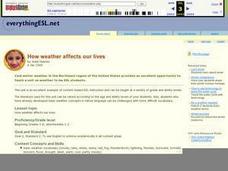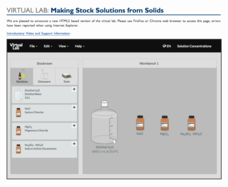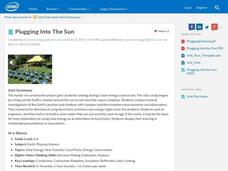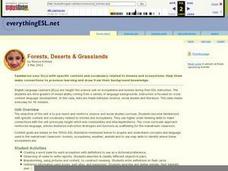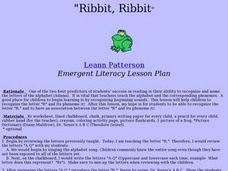University of California
Energy and Biomass Pyramids
Young scientists play tag as they act out the food pyramid in the ocean ecosystem. Energy circles pass from the smaller prey to the predators and at the end of the activity, a data chart and analysis questions allow pupils to apply their...
Curated OER
Describing Physical Appearance: ELL
In this physical descriptions ELL worksheet, students complete several activities to help them describe people. Students draw and read the descriptions aloud with a partner and to their class.
Curated OER
Animals and Humans
Students identify the functions of various body parts. They participate in the "Head, Shoulders, Knees, and Toes" song, draw a picture of themselves and other mammals, and create a traced outline of their body that they add features to....
University of Texas
Matter and the Periodic Table Chemical Families and Periodic Trends
Is assembling the periodic table as simple as Tetris? Scholars arrange colored cards into a logical order and then make connections to the arrangement of the periodic table. Hands-on activities include adding trend arrows and analyzing...
Intel
Designer Genes: One Size Fits All?
In this STEM group of 10 activities, lesson two focuses on the question, "Just because we can, should we?" when considering genetically engineered food. Classes hear a scenario and, as young scientists and geneticists, must determine if...
Curated OER
How Weather Affects Our Lives
English learners practice basic weather terms from listening to two books. They keep a daily weather record for two weeks to record the type of weather, as well as the high and low temperatures for each day. Next, they complete a simple...
Intel
Beat the Heat
Explore greenhouse effect and climate change through a 15-day unit. Scholars learn about these STEM concepts by researching, conducting surveys, experimenting, and collaborating with experts in the field. They frequently communicate...
Chemistry Collective
Virtual Lab: Textbook Style Limiting Reagents Problem II
Textbook problems with a twist! Young chemists analyze an ionic reaction to identify the limiting reagent. They then make calculations to determine the concentration of unknown solutions. Finally, they put their work to the test and...
Curated OER
Pebbles, Sand and Silt -- Categorizing Fiction and Informational Books
Primary readers complete the activities in a Pebbles, Sand and Silt FOSS kit. As a class, they are given a group of rocks and they are to categorize them based on their activities in the FOSS kit. They use this information and apply it...
Chemistry Collective
Virtual Lab: Making Stock Solutions from Solids
Combine a little solid and a little water and the solution is clear! An experimental lesson has individuals make calculations to create a sample solution of a given volume and molarity. They then create the solutions using a virtual lab...
Chemistry Collective
Virtual Lab: Alcohol Density Problem
Assume the role of Canadian border control! The percent of alcohol and density of a solution are related. Young scholars use this fact to classify solutions by their alcohol content to determine if they meet Canadian import laws.
Intel
Plugging into the Sun
What's cooking? A sizzling STEM unit challenges scholars to build a solar cooker that can successfully cook an egg. The unit opens with a study of Earth's rotation, the sun's energy, and shadows. Pupils use a compass and thermometer to...
Intel
Insects: The Good, The Bad, The Ugly
What would the world be like with no insects? Ponder this question using a research-based STEM unit that encourages scholars to investigate insects from both a beneficial and hazardous perspective. They learn about insect behaviors,...
Intel
Forensics: Get a Clue
Although the methods are all scientific, forensic science was started by police officers rather than scientists, who relied on observation and common sense. Young detectives use many tools to solve crimes around the school in a...
Curated OER
Forests, Deserts, & Grasslands
Third graders complete activities to become familiar with the content and vocabulary related to biomes and ecosystems in order to mainstream into the classroom.
Curated OER
Scientists Create Energy-Making Artificial Leaf (29th March, 2011)
Students read an article about alternative energy and complete the associated worksheets. In this ESL/ELL alternative energy lesson, students read or listen an article about research at MIT in which scientists designed a energy-making...
Cornell University
Plant Cell Crime Scene
Use science to solve the mystery of the Poplar murder. Pupils use forensic botany to determine if a suspect could be the killer. By analyzing images from a Transmission Electron Microscope, learners determine if the material found on the...
Cornell University
Constructing and Visualizing Topographic Profiles
Militaries throughout history have used topography information to plan strategies, yet many pupils today don't understand it. Scholars use Legos and a contour gauge to understand how to construct and visualize topographic profiles. This...
Columbus City Schools
Experiencing Eclipses
Don't be caught in the dark! Young scientists investigate the causes of both solar and lunar eclipses using an interactive to help them understand the development of an eclipse over time. They then research facts and characteristics...
PHET
Forces and Motion
The average American will move 12 times, which results in a lot of moving furniture! Class members consider the forces required to move objects with a creative simulation that opens with the forces required to push a filing cabinet....
Curated OER
Body Parts Vocabulary
Students identify the main parts of the human body. In this human body vocabulary lesson, students trace each other's body outline on butcher paper and label the parts of the body. Students define what each body part does. This lesson is...
Curated OER
Understanding the Indoor Environment
Students participate in an activity to recognize the meaning of words about air quality indoors. In this air quality vocabulary lesson, students are given a word and must stand when its definition is given. Students create original...
Curated OER
Ribbit! Ribbit!
Students research a frog's life cycle and habitat using books, the Internet and lecture. Students make origami frogs, write letters to Toad from Arnold Lobel's "Frog and Toad" and participate in a simulated camouflage activity.
Curated OER
Electron Current Flow
Students observe how an electrical current passes through a conductor and the relationship between voltage and resistance. In this investigative activity students participate in an activity that allows them to see the correlation...





